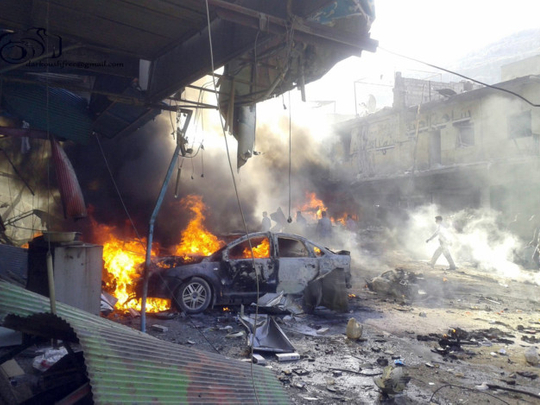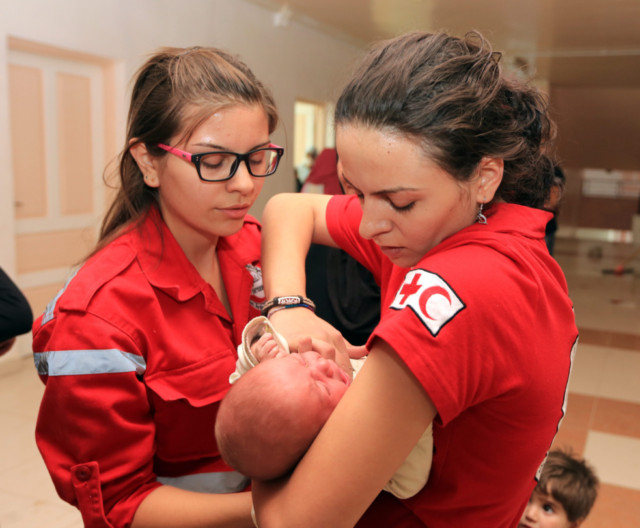
Damascus: A powerful car bomb killed at least 20 people in Syria’s Idlib on Monday, a day after gunmen abducted seven Red Cross aid workers in the northwestern province.
The Syrian Observatory for Human Rights said the blast in the town of Darkush killed at least one child and that the death toll could rise because many of the wounded were in a serious condition.
Activists said the blast targeted the market area of the town, which is a few kilometres from the border with Turkey, on the Orontes river.
The attack came a day after six members of the International Committee of the Red Cross and a member of the Syrian Red Crescent were kidnapped in Idlib province by “unidentified armed men”.
“We call for the immediate and unconditional release of the seven colleagues,” said Magne Barth, head of the ICRC’s Syria delegation.
The ICRC has not commented on the nationality of those abducted, and there has been no claim of responsibility.
Rebels control large swathes of Idlib, and kidnappings have become an increasing problem in rebel-held parts of Syria, targeting both journalists and aid workers.
The Red Cross, a rare aid group working on both sides of the conflict, said the team had travelled to Idlib on October 10 to assess the situation at health facilities and deliver aid.
Speaking to Swiss radio on Monday, ICRC spokesman Ewan Watson said the kidnapping would not stop the group’s work in Syria.
“We don’t have any intention of stopping our activities in Syria, but of course this situation makes us reflect and take a close look at our operations,” he said.
Another ICRC spokesman, Simon Schorno, said that the organisation has “not spoken to our colleagues or with the people who are holding them”.
Schorno said staff members had been held for a “matter of hours” in an incident in Syria earlier this year.
But Sunday’s incident appears to be the first time the organisation’s members have been kidnapped in the country.
Russia urges US to get opposition to talks
On the political front, Russian Foreign Minister Sergei Lavrov called on Washington to bring the Syrian opposition to peace talks in Geneva that are proposed for mid-November.
The call came a day after the Syrian National Council - a key component of the National Coalition recognised by most Arab and Western governments - ruled out attending any Geneva peace talks, and said it would quit the umbrella group if it participated.
“We very much expect our American partners and other countries, which not only have influence on various opposition groups but also... encourage these opposition groups... to realise their responsibility for creating conditions for performing their share of the work for convening Geneva 2,” Russian Foreign Minister Sergei Lavrov said.
Washington threatened military strikes in response to August 21 sarin gas attacks in the Damascus suburbs that killed hundreds of people.
The strikes were averted by a US-Russian deal under which Syria is turning over its chemical arsenal for destruction and intensified efforts are being made to convene the peace talks.
Justifying the boycott on Sunday, National Council chief George Sabra said the international community had failed to punish the sarin attack or address the plight of civilians in neighbourhoods besieged by regime troops, including the Damascus suburb of Moadamiyet Al Sham.
On Sunday, the ICRC said it and the Syrian Arab Red Crescent (SARC) had evacuated 3,500 people from the neighbourhood over 24 hours.
Most were women and children “in a state of major fatigue and were very scared,” SARC head of operations Khaled Erksoussi said.
Moadamiyet al-Sham was targeted in the August 21 sarin attack, which the opposition and Western governments blame on Damascus, something it denies.
The United Nations and the Organisation for the Prohibition of Chemical Weapons have dispatched experts to Syria to verify and destroy its chemical arsenal.
On Sunday, UN chief Ban Ki-Moon appointed Sigrid Kaag to lead the joint mission. The appointment will be voted on by the Security Council on Wednesday.
The joint team of 60 experts and support staff have been in Syria since October 1, carrying out the terms of a Security Council resolution enshrining the US-Russian deal.












